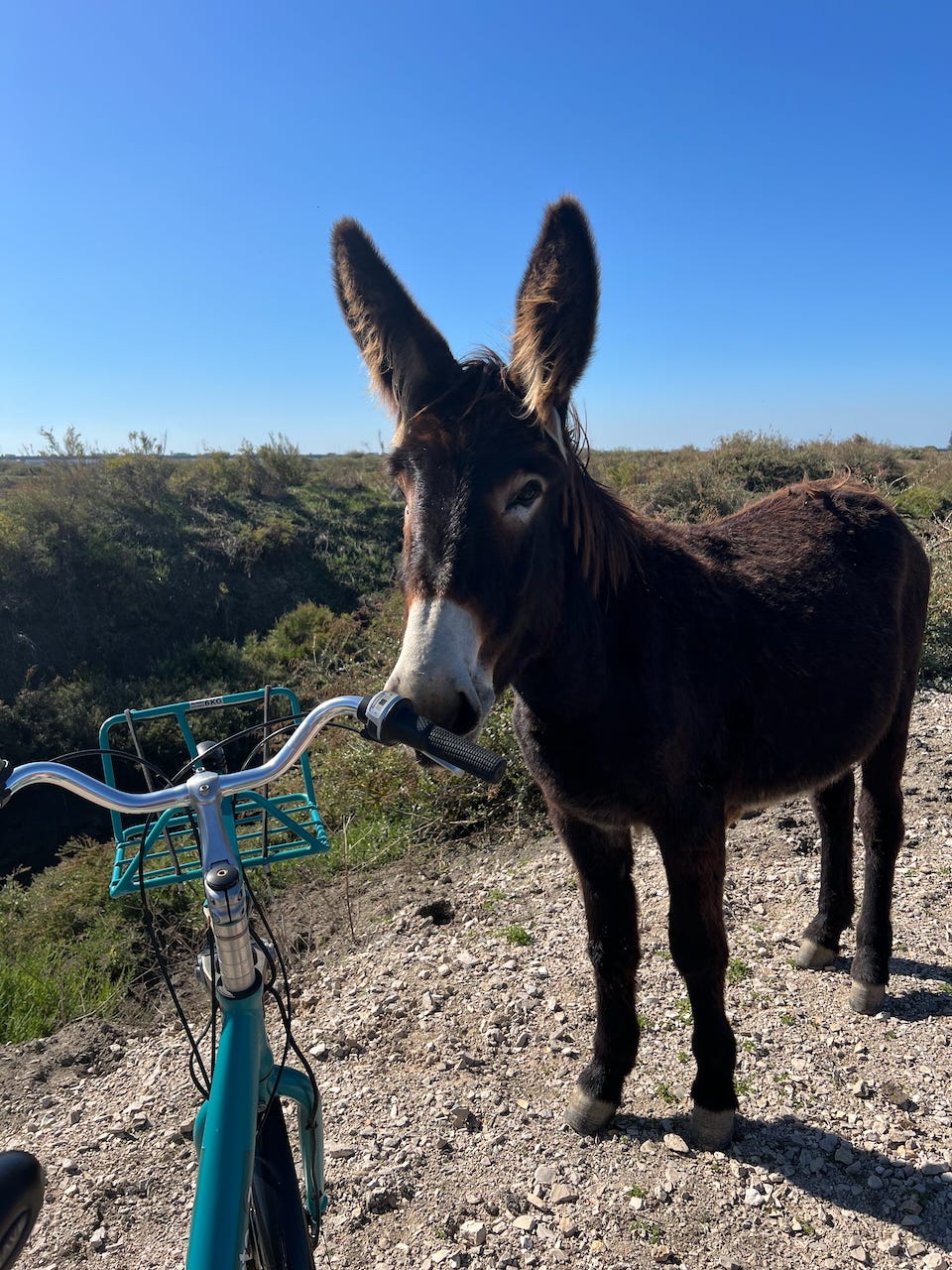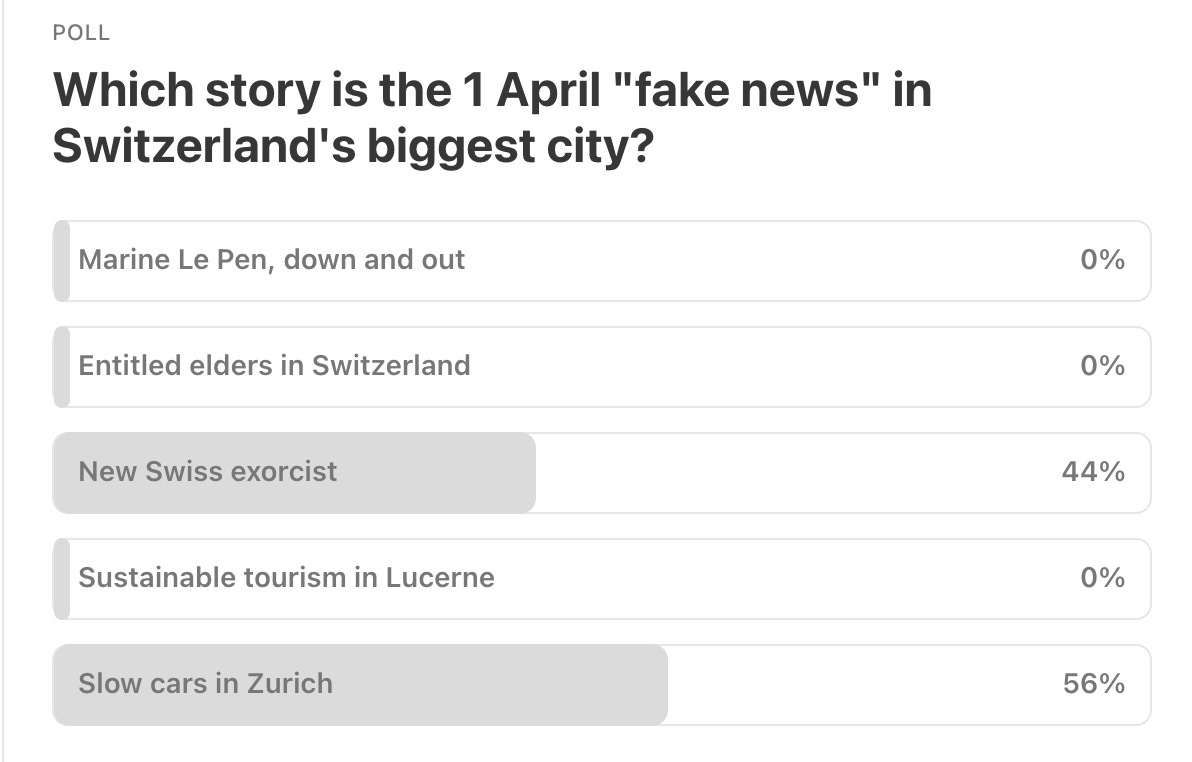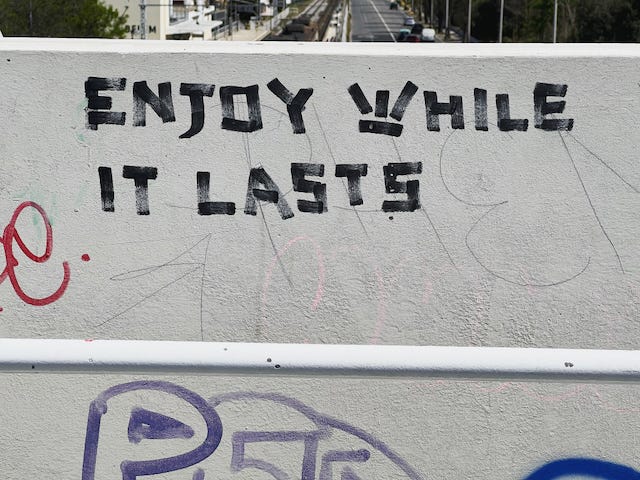
As promised on the first of April, I am revealing to my nine eager readers the Real Fake News as published in the NZZ (Neue Zürcher Zeitung, the world’s best German-language newspaper and my local) for April Fool’s Day.
Just to remind you, there were five bits of improbable news offered up for your contemplation.
No one voted for the page one blaster “Marine Le Pen banned from standing for election.” Clearly this is because my nine eager readers (i.e., those who actually voted in the poll) and hundreds of other less-eager readers are savvy consumers of international news. Sadly for Madame Le Pen, it’s all true.
Oddly enough, no one fell for “The working population in Switzerland suffers more than retirees,” despite my description including “the latest federal statistics on the ‘rate of deprivation’. “ Swiss people, deprived?1 We are really good at measuring things, also at complaining, so yes: it’s true.
A whopping 71% of those over 65 said they were financially satisfied, while only 54% of those still in their working years said the same. The survey also asked specific financial questions, such as: Are you behind on payments for rent, interest, or utilities? Can you cover an unexpected expense of 2500 francs within a month? Have you had to give up a regular hobby or activities in your free time because of costs involved? From topics like this, the Federal Statistics Office concluded that 5.4% of those aged 25 to 49 and 6.1% of those aged 50 to 64 have suffered material or social deprivations. After age 65, only 4.2% have financial FOMO and those above 75 have practically no financial worries (2.7%).
The survey also asked specific financial questions, such as: Are you behind on payments for rent, interest, or utilities? Can you cover an unexpected expense of 2500 francs within a month? Have you had to give up a regular hobby or activities in your free time because of costs involved? From topics like this, the Federal Statistics Office concluded that 5.4% of those aged 25 to 49 and 6.1% of those aged 50 to 64 have suffered material or social deprivations. After age 65, only 4.2% have financial FOMO and those above 75 have practically no financial worries (2.7%).2
So far, so good
Now the votes start pouring in: Some of you are convinced that the Roman Catholic Diocese of Lugano in southern Switzerland did not appoint an official exorcist, because… 21st century? Dear readers, this is the Roman Catholic Church, where time is measured in eternities.
Apparently the last priest with this function died in 2020 and the office had been vacant ever since. This brings the total of official exorcists in Switzerland’s six dioceses to three. Two exorcists are in the combined diocese of Fribourg-Lausanne-Geneva. Interestingly, the dioceses in German-speaking Switzerland (St Gallen, Chur, and Basel) don’t seem to need an exorcist; nor do the Catholics in Sion (southern Alps).
This, friends, is true. A certain priest in Ticino was appointed to this function very discreetly at the end of last year. In the news published in the local Catholic bulletin on 13 December 2024, his name was not even mentioned, since he had yet to complete his training and appoint his staff.
But the Italian-speaking canton of Ticino is small, and the name of the exorcist-to-be quickly became semi-public knowledge. Although Switzerland as a whole is small, it is divided by language barriers and, in this case, the Alps, so it took a few months more for the leak to reach Zurich. The former pastor of St. Stephan’s in Tesserete declined to comment to the NZZ on his new calling, but referred the reporter to more talkative exorcists working across the border in Lombardy. Don Roberto Pandolfi, exorcist for the Diocese of Como and prolific author, was more than happy3 to promote his latest book, ehm, explain the role of an exorcist in today’s Roman Catholic Church.
Off to meet the Wizard
No one chose “The Wizard of Entlebuch versus mass tourism.” The so-called Wizard of Entlebuch is the Michelin-starred chef Stefan Wiesner, internationally known for his avant-garde, nature-based cuisine. Participants in a sustainable tourism conference in the Swiss tourism hotspot Lucerne made an excursion to Wiesner’s restaurant in a remote village in the UN-recognized Biosphere Entlebuch (in the Canton of Lucerne).
The struggle is real. The picturesque city of Lucerne is a magnet for mass tourism, with buses full of camera- and credit-card-toting tour groups regularly clogging the city center. Where else do you get a lake, snow-capped mountains, historic paddleboat steamer ships, chocolate, luxury Swiss watches, fine jewelry, and a cheese fondue served outdoors year-round in one three-hour stop?
Starting 1 April, the city of Lucerne even introduced a fee for buses dropping off and picking up passengers at central tourist stops. Whether this cuts down the cruise-ship-like visits (or just fills the city’s coffers) remains to be seen.
The majority of alert readers voted for “Canton puts a stop to the city’s speed limits.”
Here we a have a city with excellent, popular, regionally-anchored public transport, but like everywhere else in the world, there are more cars as the population grows. One of the many methods to discourage drivers has been to reduce city speed limits from 50 kph to 30 kph (for US readers, 30 mph to 18 mph). Now some city council members are now calling for 20 kph (12 mph) to change the “street hierarchy”. Seemingly tired of this, the cantonal council has revoked the city’s override privilege after 154 years and will now be setting the speed limits on cantonal streets and roads with supra-municipal significance.
I don’t know if the idea of forcing auto traffic to crawl through Zurich at 20 kph seemed totally absurd, or if the idea of state and local government haggling over who gets to make the rules seemed too weird.
This is the weirdness we live in here. Switzerland has the luxury of worrying about the small things. In fact, we like to do that— it’s much easier than attempting to solve bigger questions, such as the real meaning of neutrality.4
Anyway, the cantonal government pointed out correctly that the two cities with an exception to the speed limit setting rule are exactly that, the exceptions, and restored order to the hierarchy of rules. Besides, public transportation costs in Zurich would have soared by 20 million francs annually because the (electric) buses and trams that share the roads with cars (and bicycles, and e-scooters, etc.) would have to re-work their routes and reduce frequency because they would become unable to keep to their current admirable schedule. Not so green after all.
But wait!
If you’ve read this far, you now know that all five news stories in the NZZ on 1 April 2025 were true. Before anyone accuses me of not playing fair, I would like to voice my disappointment with the venerable Zurich daily for not playing the game this year. Maybe there is enough unbelievable stuff going on in the world right now that the editors didn’t want to take the risk.5
Plenty of others, including some of Switzerland’s best-known brands, had some fun on the day, refuting the oft-made claim that the Swiss have no sense of humor.6 For a peek into the Swiss soul, there’s a summary of the media antics on a popular online news portal – which even had its readers vote on their favorites. Like politics, all humor is local.
Bhutan measures gross national happiness; Switzerland measures the rate of deprivation. What does this tell us about the two cultures?
Sad trombone sound here for everyone not living in Switzerland. (Except those in Luxembourg, Norway and Austria, which ranked ahead of Switzerland in the last available comparison of purchasing power statistics from 2022.)
If you are really intrigued about the demand for exorcism in northern Italy, here’s a link to an extended interview with Don Roberto (in Italian).
I am working on a piece about Swiss neutrality; once it makes sense, you’ll read it here.
My inquiry regarding the absence of an Aprilscherz went unanswered.
The other 364 (or 365) days of the year, they do not.








I had no idea we had exorcists!!! This was a good read; you clearly pay far more attention to Swiss news and politics than I do. Although I do watch the news on TSR quite regularly, once get to Guy Parmelin and his merry men my neurones start thinking up random poems. I wrote a funny poem for April Fools last year year, I think it's called Switzerland Declares Romcoms Obligatory Reading! I was quite pleased with it. I'll have a dig and repost it and tag you as a fellow Swissy!
Foul on the play ! but fun reading ...